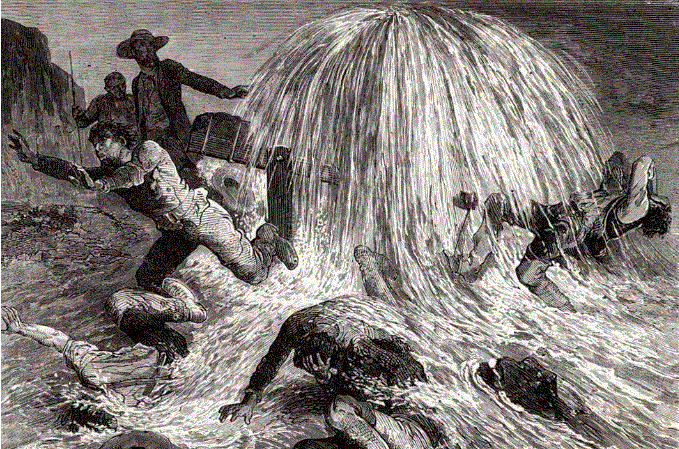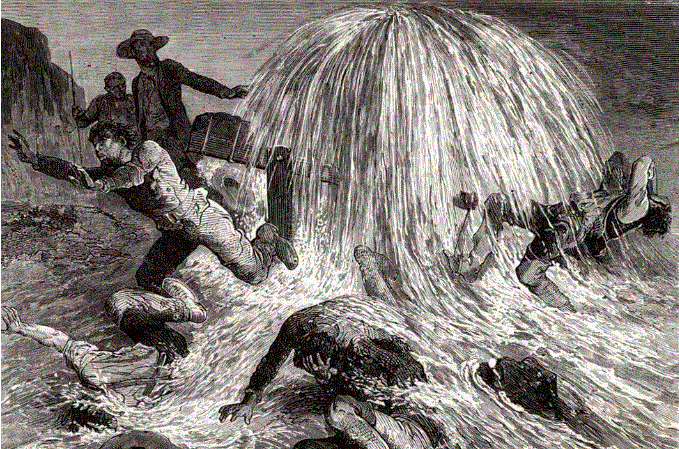
The chronicles of the Indians indicate that when the natives of Cubagua observed, in the middle of the 16th century, a black liquid that floated on the sea they called it “the devil’s excrement”. This is how oil appears, and it is many years later, in the 20th century, when the exploitation of the so-called “black gold” begins, which is already more than a hundred years old.
In its early days, Roman Law established that everything that was under the ground belonged to the owner of the land. Consecrates the principle of annexation. When the empire spread impressively, they decreed that for the Romans this was still the case, but what was found under the ground in the conquered territories had to be of the Roman people and administered by the State. In England, the original principle is accepted that everything that appears below the ground belongs to individuals and that Anglo-Saxon right passes to the thirteen colonies that later form the United States of America. The northern country is populated in principle by Quakers and pilgrims (pilgrims), who are religious and political persecuted, who go forever to found a new country or New England (New England). The opposite happens with the Spanish conquest. The Spaniards came up with the idea of taking all the wealth from the subsoil to the Crown, which adopted the criterion that all the wealth from the subsoil belonged to them. With independence, Bolívar decreed in Quito in 1828, that now instead of being these riches of the subsoil of the Spanish crown, they belong to the State of Gran Colombia. This despite being the owner of the Aroa mines. With the arrival of oil production, Juan Vicente Gómez establishes that these subsoil riches are inalienable and always of the State, with which he prohibits the transfer of these lands that are property of the nation. What Gómez did was hyperbole the principle that all subsoil wealth belonged to the nation. State that he administered as if it were his personal estate, so that everything was ultimately his. The most that Gómez allowed himself was to give some concessions to his acolytes for a very limited time. Gómez gave the power to the oil companies to make the laws on crude oil and they also preferred to deal with only one (Gómez) than with a number of individuals, who as concessionaires each wanted a different negotiation. In the United States, the model that was adopted was the opposite, individuals were the owners of the oil, which led to the decentralization of oil wealth and the State did not pool all the resources. In England, around the 1930s, Labor nationalized the mines and the oil and the economy began to collapse until Margaret Thacher came along and reverted everything to the original principles. Even the state-owned British Petroleum was privatized. In Venezuela, CAP I nationalizes oil, reversing the concessions of the oil companies before their expiration and concentrating all the infrastructures in the state-owned PDVSA. When the first big rise in prices took place during her administration, so many resources entered the central State that they began to distort an economy that was not prepared for its administration. The State became much larger and got involved in so-called “white elephants” or unproductive projects that were going to generate losses for the nation. The so-called “Saudi Venezuela”, the “cheap Ta’ give me two” and “Mayamera Venezuela” were the consequences of the so-called “Dutch disease”, where a currency is overvalued and everything that comes from abroad is bought much cheaper, making the country uncompetitive. The roller coaster of oil prices did a lot of damage to a country unprepared to manage wealth that had not been earned by its efforts. When prices fell during the second government of President Caldera, the “oil opening” began, which meant giving conditions to foreign companies to invest again in Venezuela. In any case, the national oil company managed itself professionally and away from politics until Chavismo arrived. In a few years, more than 20,000 very well-trained workers were fired from the state company and the company became politicized, to the point that its president boasted of having a “red red” PDVSA. The opening law was reformed, imposing uncompetitive conditions on foreign investment, which is so necessary. President Caldera at the end of his term created a Norwegian-style stabilization fund that Chavez tore into pieces in no time. When institutional controls were also dismantled, looting became generalized and there was not even enough money to pay the oil bonds and debts. The reflection is relevant because if we had left the oil to the owners of the land and we had adopted the Texas model, and left a fund like the Norwegian one, another rooster would crow. Today, oil, instead of being black gold, is the excrement of a devil who represents an inefficient and corrupt state that is starving Venezuela. The latest university survey of poverty puts it at 94.5%. The challenge is to get out of the rentier Venezuela towards the productive and competitive one. For this, the change of government is imperative…
@OscarArnal








